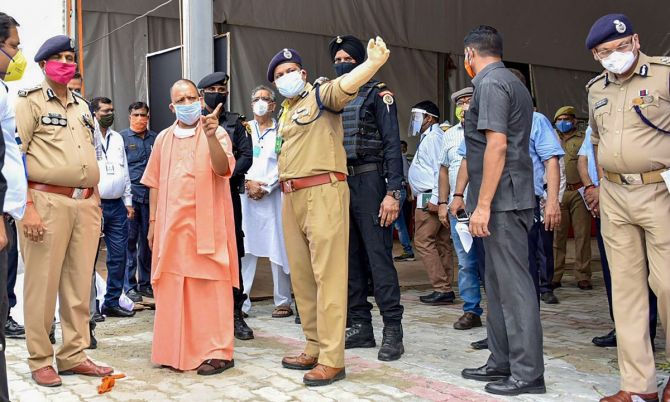Religious rituals got under way in Ayodhya on Monday, two days ahead of the groundbreaking ceremony for a temple at a spot where devotees believe Lord Ram was born.

Barricades are already in place in the temple town and Uttar Pradesh Chief Minister Yogi Adityanath issued an appeal, asking only those invited for Wednesday's 'bhoomi pujan' ceremony to come to Ayodhya.
Adityanath spent hours reviewing the arrangements for the ceremony at the Ram Janmabhoomi, where the temple will be constructed following the go-ahead last year by the Supreme Court.
Twelve priests on Monday conducted prayers dedicated to Lord Ganesh. This was to be followed by prayers to the deities of the dynasties of Lord Ram and goddess Sita. On Tuesday, prayers will be offered at Ayodhya's Hanumangarhi temple.
Among the 175 people invited for the main ceremony are 135 `sants' belonging to that many spiritual traditions, the Shri Ram Janmabhoomi Teerth Kshetra said in a series of tweets and a press conference.

The trust also noted 'certain practical difficulties' faced by some guests -- including religious figures in participating in the ceremony because of the coronavirus pandemic.
Bharatiya Janata Party veteran Uma Bharti, a key figure in the Ram temple movement and an accused in the Babri mosque demolition case, said she will not attend because of concerns over catching the infection.
The trust asked devotees to organise 'bhajans' and 'kirtans' in places outside Ayodhya as well, while keeping restrictions related to COVID-19 in mind.
Among the people invited to the event is Iqbal Ansari, a litigant in the temple-mosque land dispute case. "I will certainly attend it. The dispute is over now after the court's verdict," said Ansari, 69.
His father Hashim Ansari, the oldest litigant in the case, died n 2016. After that the son pursued the case in court.
Mohammad Sharif, an Ayodhya-based social activist who also got the invitation, will not be able to attend as he is too old and ill, his family said.

On the dais, there will be just five people -- Narendra Modi, Rashtriya Swayamsevak Sangh chief Mohan Bhagwat, trust chief Nritya Gopaldas Maharaj, Uttar Pradesh Governor Anandiben Patel and CM Yogi Adityanath.
Left parties opposed the event, saying holding the ceremony with the 'involvement' of the Centre and the state government went against the Supreme Court verdict which directed the formation of a trust.
In separate statements, both the Communist Party of India and Communist Party of India-Marxist also said the Supreme Court, while delivering the verdict, had condemned the demolition of the Babri Masjid in 1992.
Senior Congress leader Digvijaya Singh too sounded a discordant note, asking Modi to defer the event as this was an "inauspicious" period.
The former Madhya Pradesh chief minister cited a list of politicians who have been infected by coronavirus and said a Hindu seer he has spoken to also agreed about the time being "inauspicious" for beginning any good work.
Madhya Pradesh Chief Minister Shivraj Singh Chouhan, who is among those struck by the disease, hit back.
"Congress leaders who had rejected the existence of Lord Ram are today trying to fix the auspicious-inauspicious time for the construction of a temple in his name," he tweeted.

Yogi Adityanath called the event 'historic'.
"It is not only a historic but also an emotional moment as after 500 years the Ram temple work will start. It will be the foundation of a new India," he said.
"The COVID-19 protocol will be strictly followed at the event. As the prime minister will be here representing 135 crore people, I appeal that only those who have been invited should visit Ayodhya. The rest should remain at their respective places," Adityanath said.
The ceremony will be broadcast live by Doordarshan.
The chief minister urged people to light earthen lamps, decorate temples and recite the Ramayana in memory of those "who laid down their lives in the temple struggle".
The mosque in Ayodhya was demolished in December 1992 by 'kar sevaks' who claimed an ancient Ram temple had stood on the same site.
Last November, the apex court paved the way for the construction of a Ram temple at the site and directed the Centre to allot an alternative five-acre plot for building a new mosque in Ayodhya.










